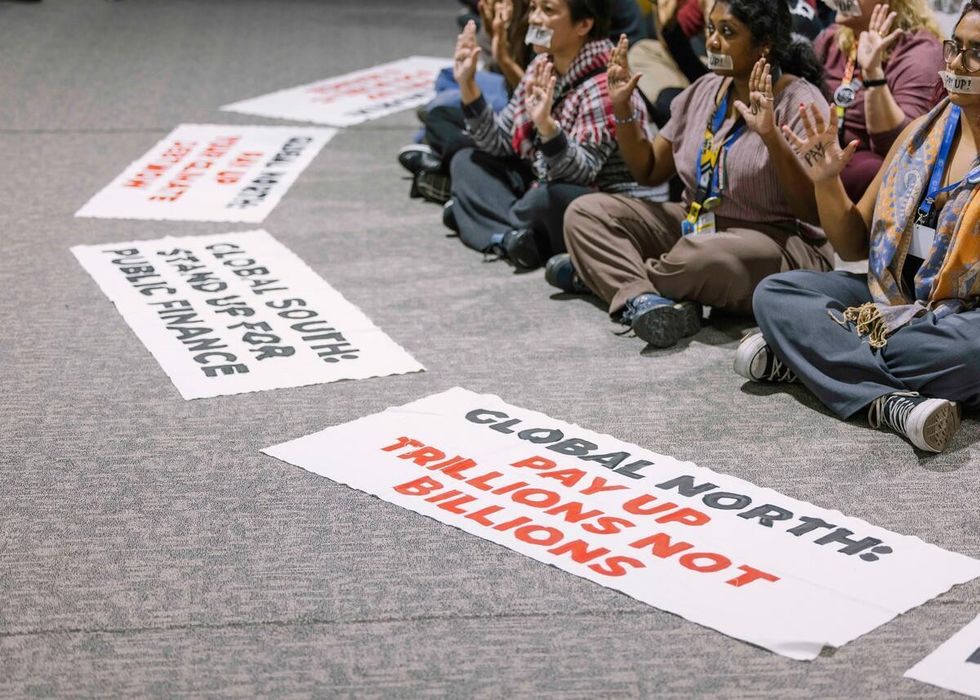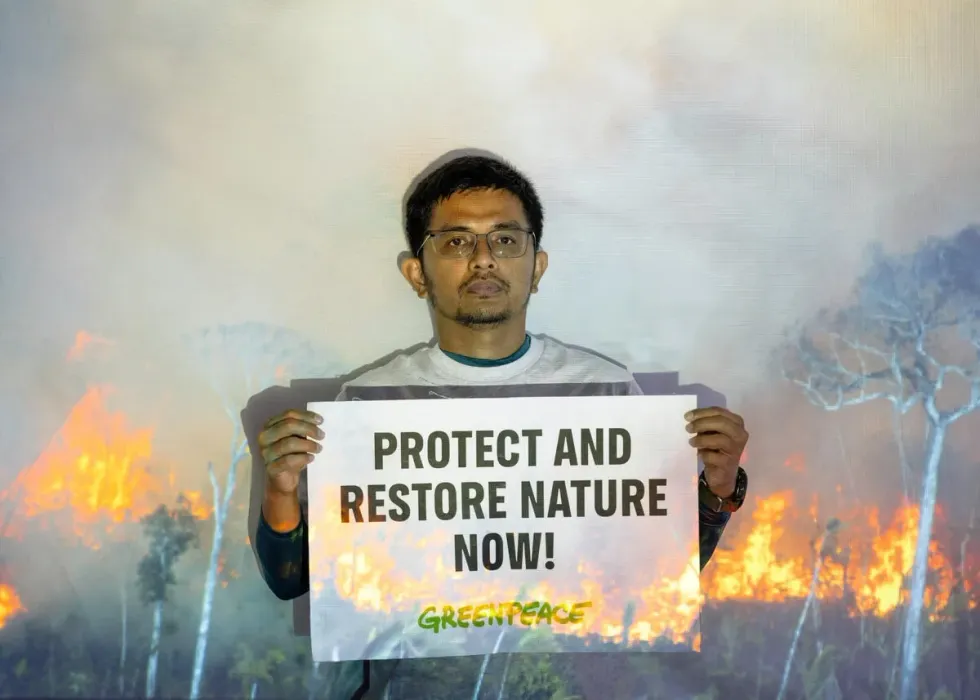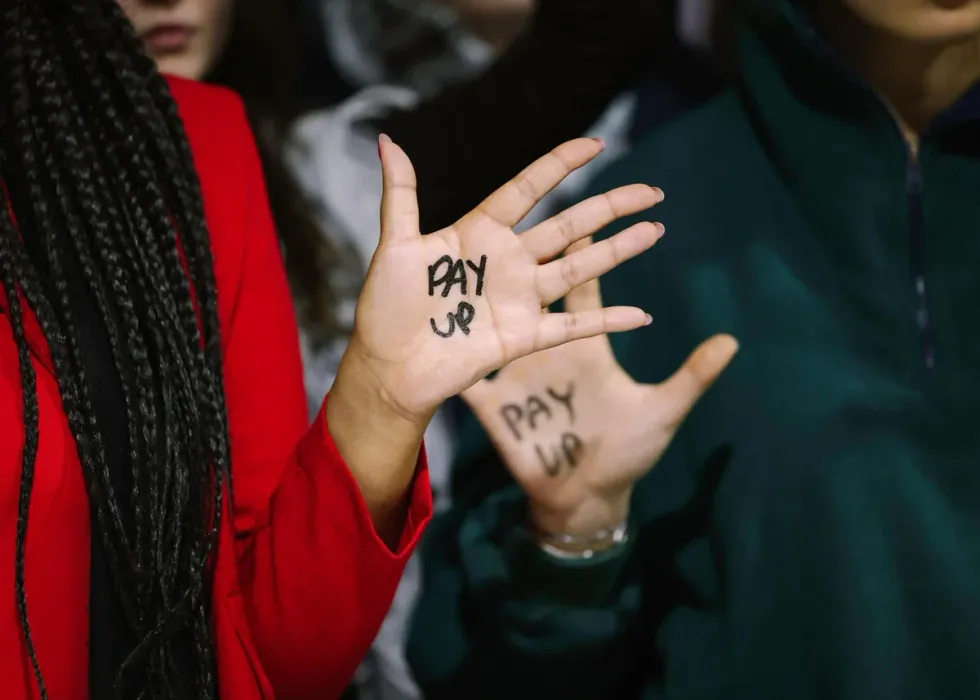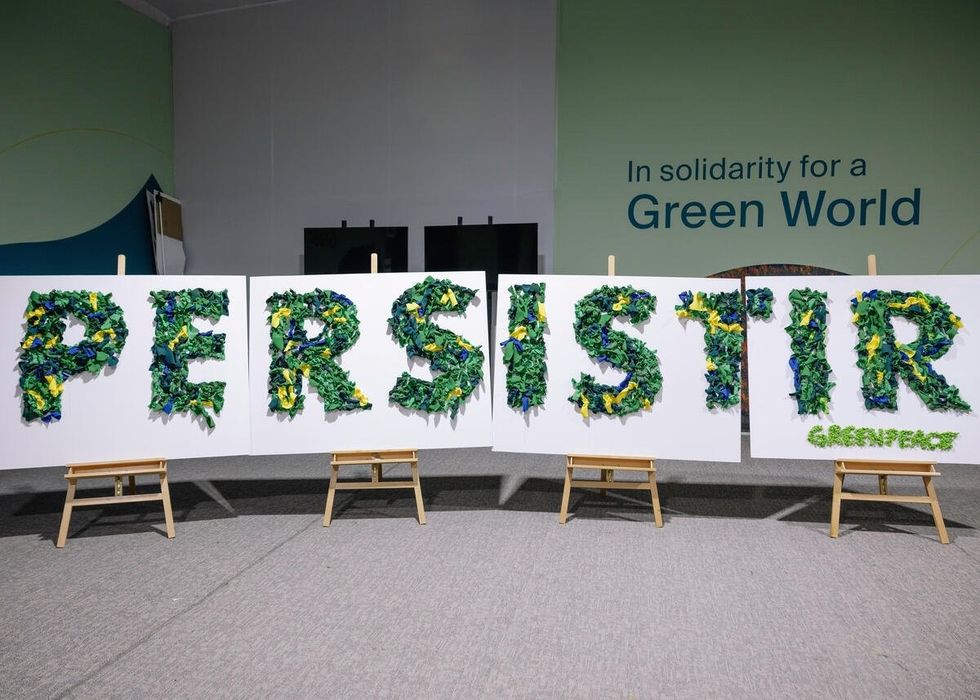

SUBSCRIBE TO OUR FREE NEWSLETTER
Daily news & progressive opinion—funded by the people, not the corporations—delivered straight to your inbox.
5
#000000
#FFFFFF
To donate by check, phone, or other method, see our More Ways to Give page.


Daily news & progressive opinion—funded by the people, not the corporations—delivered straight to your inbox.
Rich countries must pay up for the climate action needed to halt the climate crisis they have created and remedy the climate harms that they have inflicted.
The recent COP29 climate finance deal is a stark example of how wealthy historical emitters continue to evade their responsibilities to pay for climate action and remedy climate harm. But they cannot escape rising demands for accountability. In the historic hearings on states' climate obligations at the International Court of Justice, which are drawing to a close, developing nations are forcing them to face the law.
The timing of these ICJ hearings, on the heels of yet another failure of the United Nations climate talks, underscores what's at stake.
The headlines have called COP29's climate finance deal a triumph of diplomacy, but this could not be farther from the truth. Wealthy nations responsible for the majority of cumulative greenhouse gas (GHG) emissions have carefully engineered an escape from their climate obligations through a deal the terms of which are too loose, and that offers too little, too late.
We know rich countries can deliver the grants they owe to the Global South. They can raise well over $5 trillion a year by ending fossil fuel handouts, taxing the rich, and changing unfair global financial rules.
It's too loose: Despite the deal's reference to two finance figures, $1.3 trillion and $300 billion, both constitute a hollow promise. The text fails to hold developed countries to their legal duty to provide climate finance to the Global South. Actors are merely "called upon" to work toward scaling funding to $1.3 trillion per year by 2035, without any binding commitments. Even the $300 billion annual goal has been carefully worded to avoid any concrete obligations. Developed countries are only required to "take the lead" in "mobilizing" these funds, which can come from private finance, multilateral development banks, and other "alternative" sources.
As multiple states including Colombia, Sierra Leone, and Seychelles emphasized during the ICJ hearings, this vagueness disproportionately impacts debt-stressed nations already struggling to fund climate action. If rich countries can pass the buck to the private sector and Global South, the most climate-vulnerable nations may be forced to take on more loans and private investment schemes rather than grants, deepening the historic debt crisis already affecting 93% of them.
Private finance cannot cover the costs of climate action in the Global South. That approach has been tested and failed. Nor can carbon markets fill the gap. Yet, the deal leaves the door open to carbon finance being wrongly counted as climate finance, allowing polluters to claim other countries' climate action as their own through carbon offsets rather than requiring them to pay up and phase out fossil fuels at home. With under 16% of carbon credits currently achieving actual emission reductions, this doesn't underwrite climate ambition, it undermines it.
It's too little: Contrary to what UNFCCC lead Simon Stiell has suggested, what was agreed at COP29 is not a tripling of climate finance. When adjusted for inflation, the $300 billion target is no meaningful increase compared to the $100 billion annually promised by 2020—which rich countries failed to meet. As the decision's own preamble acknowledges, the scale of need in developing countries is on the order of trillions, not billions, annually for climate action between now and 2030. And that figure is neither unreasonable nor out of reach. For context, rich nations currently spend $378 billion yearly on fossil fuel subsidies alone, and fossil fuel companies raked in an average of over $1 trillion in annual profits over the last 10 years. The money exists—it's just being invested in climate destruction rather than climate action.
It's too late: Waiting until 2035 for full implementation of climate finance goals essentially writes off this critical decade for climate action.
The inadequacy of this climate finance deal means planning for failure when it comes to fossil fuel phaseout, and therefore locking in climate catastrophe. The necessary global transition away from fossil fuels can't happen at the speed and scale required unless the biggest polluters pay. The ink has barely dried on the agreement, and wealthy nations are already on the offense. E.U. Climate Commissioner Woebke Hoekstra suggested in De Telegraaf that the E.U. could reduce its share of climate finance contributions since "other country contributions count too." Meanwhile, U.K. Energy Secretary Ed Miliband reframed the entire deal as an "investment opportunity," suggesting that private sector funding could cover the bill—precisely the kind of responsibility-shifting the agreement's language enables. Hoekstra celebrates the deal as 'the start of a new era for climate finance'. Sadly, this is true. A new era where the E.U., U.K., and other rich nations dodge their responsibility to pay—one where everyone is responsible and thus no one is.
But we know rich countries can deliver the grants they owe to the Global South. They can raise well over $5 trillion a year by ending fossil fuel handouts, taxing the rich, and changing unfair global financial rules.
We also know failing to provide needed climate finance doesn't just condemn Global South countries suffering most acutely from a crisis they didn't create. It undermines our collective future.
As the International Court of Justice deliberates on states' climate obligations, this inadequate finance deal illustrates exactly why judicial scrutiny and legal clarity is needed. The world cannot afford another decade of wealthy nations dodging their responsibilities while climate disasters mount.
We reject this deal for what it is—a carefully constructed escape hatch for wealthy nations. It's high time for the biggest polluters to stop hiding behind voluntary pledges and using the climate regime to protect themselves from climate accountability, rather than to protect people and the planet from climate destruction. Rich countries must pay up for the climate action needed to halt the climate crisis they have created and remedy the climate harms that they have inflicted. Doing so is not just a moral imperative, it's a legal obligation.
Despite what was and was not agreed in Baku, meaningful climate action will only become more urgent than ever.
After extra time of exhausting negotiations, the 29th U.N. Conference on Climate Change is over.
First, a quick refresher of what COP29 was meant to achieve: dubbed a ‘finance COP,’ countries were expected to come to Baku, Azerbaijan ready to present in good faith various finance deals to strengthen the global response to climate change.

The final agreement
After two slow-moving weeks of climate talks, COP29 ended with a woefully inadequate agreement on a new annual public climate finance goal of US$300 billion by 2035, a dismaying offering. The final agreement overall also included disappointing loopholes on carbon markets and little climate action, but no backsliding on the COP28 decision to transition away from fossil fuels. The final outcome in Baku removed the references to the Make Polluters Pay principle at the last hour, further disheartening civil society and countries already bearing the brunt of the climate crisis.

COP29 was an opportunity to agree on a significant climate finance goal and follow up on what was promised at COP28 and the Biodiversity COP16. But that did not exactly happen. Despite what was and was not agreed in Baku, meaningful climate action will only become more urgent than ever.
A moment of hope
Not all is lost though. The final outcome fell short of what was hoped for, and what is needed to battle the climate crisis. But the people power in Baku made its presence felt. Navigating tight guidelines and pushback on peaceful protest for a third year in a row, civil society got creative to still make its demands heard, and will return even more determined next year. The time for debate is over; decisive action is the demand of the hour.

What comes next for climate action
COP30 will return next year, in the Amazon city of Belem, Brazil, with high expectations for renewed climate action.

But climate justice will only be delivered when there is adequate, and then some, finance for climate-vulnerable communities, and not just distributed for loss and damage, but for adaptation and mitigation too. A future with climate justice means the production and consumption of oil and gas has been ended, forests protected, and polluters paying for the damage, destruction, and deaths the climate crisis is causing.
Baku might have stumbled on climate justice, but we will persist in the fight for our future.
Critics of the "COP of false solutions" said that instead of much-needed funding, developing nations got "a global Ponzi scheme that the private equity vultures and public relations people will now exploit."
It was early Sunday by the time the United Nations climate summit wrapped up in Baku, Azerbaijan after running into overtime to finalize deals on carbon markets and funding for developing countries that were sharply condemned by campaigners worldwide.
"COP29 was a dumpster fire. Except it's not trash that's burning—it's our planet," declared Nikki Reisch of the Center for International Environmental Law. "And developed countries are holding both the matches and the firehose."
Recalling last year's conference in the United Arab Emirates, Oil Change International global policy senior strategist Shady Khalil highlighted that "the world made a deal at COP28 to end the fossil fuel era. Now, at COP29, countries seem to have been struck with collective amnesia."
"With each new iteration of the texts, oil and gas producers managed to dilute the urgent commitment to phase out fossil fuels," Khalil said. "But let's be clear: Rich countries' failure to lead on fossil fuel phaseout and to put the trillions they have hoarded on the table has done more to imperil the energy transition than any obstructionist tactics from oil and gas producers."
This year's conference began November 11 and was due to conclude on Friday, but parties to the Paris agreement were still negotiating the carbon market rules, which were finalized late Saturday, and the new collective quantified goal (NCQG) on climate finance.
"The carbon markets in Article 6 of the Paris agreement were pushed through COP29 in a take-it-or leave-it outcome," said Tamra Gilbertson of Indigenous Environmental Network, decrying "a new dangerous era in climate change negotiations."
As Climate Home Newsreported, they establish two types of markets: "The first—known as Article 6.2—regulates bilateral carbon trading between countries, while Article 6.4 creates a global crediting mechanism for countries to sell emissions reductions."
The outlet pointed to expert warnings that "the rules for bilateral trades under 6.2 could open the door for the sale of junk carbon credits—one of the weaknesses of the previous crediting mechanism set up by the U.N. known as the Clean Development Mechanism (CDM)."
Jonathan Crook of Carbon Market Watch said in a statement that "the package does not shine enough light on an already opaque system where countries won't be required to provide information about their deals well ahead of actual trades."
"Even worse, the last opportunity to strengthen the critically weak review process was largely missed," he continued. "Countries remain free to trade carbon credits that are of low quality, or even fail to comply with Article 6.2 rules, without any real oversight."
As for Article 6.4, “much lies in the hands of the supervisory body" that's set to resume work in early 2025, said Crook's colleague, Federica Dossi. "To show that it is ready to learn from past mistakes, it will have to take tough decisions next year and ensure that Article 6.4 credits will be markedly better than the units that old CDM projects will generate."
"If they are not, they will have to compete in a low-trust, low-integrity market where prices are likely to be at rock bottom and interest will be low," Dossi added. "Such a system would be a distraction, and a waste of 10 years worth of carbon market negotiations."
Some campaigners suggested that no matter what lies ahead, the embrace of carbon markets represents a failure. Kirtana Chandrasekaran at Friends of the Earth International said that "the supposed 'COP of climate finance' has turned into the 'COP of false solutions.' The U.N. has given its stamp of approval to fraudulent and failed carbon markets."
"We have seen the impacts of these schemes: land grabs, Indigenous peoples' and human rights violations," Chandrasekaran noted. "The now-operationalized U.N. global carbon market may well be worse than existing voluntary ones and will continue to provide a get out of jail free card to Big Polluters whilst devastating communities and ecosystems."
Chandrasekaran's colleague Seán McLoughlin at Friends of the Earth Ireland was similarly critical of the conference's finance deal, asserting that "Baku is a big F U to climate justice, to the poorest communities who are on the frontlines of climate breakdown."
"COP29 has failed those who have done least to cause climate change and who are most vulnerable to climate breakdown because the process is still in thrall to fossil fuel bullies and rich countries more committed to shirking their historical responsibility than safeguarding our common future," he said. "Now it's back to citizens to demand our governments do the right thing. We must keep demanding the trillions, not billions owed in climate debt and a comprehensive, swift, and equitable fossil fuel phaseout. The struggle for climate justice is not over."
Campaigners and developing nations fought for $1.3 trillion in annual climate finance from those most responsible for the planetary crisis. Instead, the NCQG document only directs developed countries to provide the Global South with $300 billion per year by 2035, with a goal of reaching the higher figure by also seeking funds from private sources.
The deal almost didn't happen at all. As The Guardiandetailed Saturday: "Developed countries including the U.K., the U.S., and E.U. members were pushed into raising their offer from an original $250 billion a year tabled on Friday, to $300 billion. Poor countries argued for more, and in the early evening two groups representing some of the world's poorest countries walked out of one key meeting, threatening to collapse the negotiations."
While Simon Stiell, executive secretary of U.N. Climate Change, celebrated the NCQG as "an insurance policy for humanity, amid worsening climate impacts hitting every country," Chiara Martinelli, director at Climate Action Network Europe, put it in the context of the $100 billion target set in 2009, which wealthy governments didn't meet.
"Rich countries own the responsibility for the failed outcome at COP29," Martinelli said. "The talk of tripling from the $100 billion goal might sound impressive, but in reality, it falls far short, barely increasing from the previous commitment when adjusted for inflation and considering the bulk of this money will come in the form of unsustainable loans. This is not solidarity. It's smoke and mirrors that betray the needs of those on the frontlines of the climate crisis."
Also stressing that "it's not even real 'money,' by and large," but rather "a motley mix of loans and privatized investment," Oxfam International's climate change policy lead, Nafkote Dabi, called the agreement "a global Ponzi scheme that the private equity vultures and public relations people will now exploit."
"The terrible verdict from the Baku climate talks shows that rich countries view the Global South as ultimately expendable, like pawns on a chessboard," Dabi charged. "The $300 billion so-called 'deal' that poorer countries have been bullied into accepting is unserious and dangerous—a soulless triumph for the rich, but a genuine disaster for our planet and communities who are being flooded, starved, and displaced today by climate breakdown."
Rachel Cleetus from the Union of Concerned Scientists, who is in Baku, took aim at not only rich governments, but also the host, saying that "the Azerbaijani COP29 Presidency's ineptitude in brokering an agreement at this consequential climate finance COP will go down in ignominy."
Cleetus' group is based in the United States, which is preparing for a January transfer of power from Democratic President Joe Biden to Republican President-elect Donald Trump, who notably ditched the Paris agreement during his first term.
"The United States—the world's largest historical contributor of heat-trapping emissions—is going to see a monumental shift in its global diplomacy posture as the incoming anti-science Trump administration will likely exit the Paris agreement and take a wrecking ball to domestic climate and clean energy policies," Cleetus warned. "While some politically and economically popular clean energy policies may prove durable and action from forward-looking states and businesses will be significant, there's no doubt that a lack of robust federal leadership will leave U.S. climate action hobbled for a time."
"Other nations—including E.U. countries and China—will need to do what they can to fill the void," she stressed. "Between now and COP30 in Brazil next year, nations have a lot of ground to make up to have any hope of limiting runaway climate change."
Ben Goloff of the U.S.-based Center for Biological Diversity called out the departing Biden administration, arguing that it "should be going out with at least a signal of its moral climate commitment, not copping out ahead of the Trump 2.0 disaster."